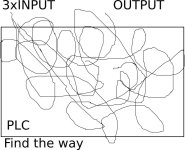Someone please tell me so that I can die with a satisfied mind.
Why, oh why, Do Beginners Think PLC Inputs Are More Important Than PLC Outputs?
I have asked this to students and others here a hundred times (most recently in this thread, post #27
http://www.plctalk.net/qanda/showthread.php?t=77217&page=3
I have never got any good answers. Is someone out there teaching this concept? Why do they think that? Where did the idea start? What keeps it going? Is it because that is the first thing they see, or read, or are told about?
I can't figure it out. Please help me.
Why, oh why, Do Beginners Think PLC Inputs Are More Important Than PLC Outputs?
I have asked this to students and others here a hundred times (most recently in this thread, post #27
http://www.plctalk.net/qanda/showthread.php?t=77217&page=3
I have never got any good answers. Is someone out there teaching this concept? Why do they think that? Where did the idea start? What keeps it going? Is it because that is the first thing they see, or read, or are told about?
I can't figure it out. Please help me.
Last edited:




